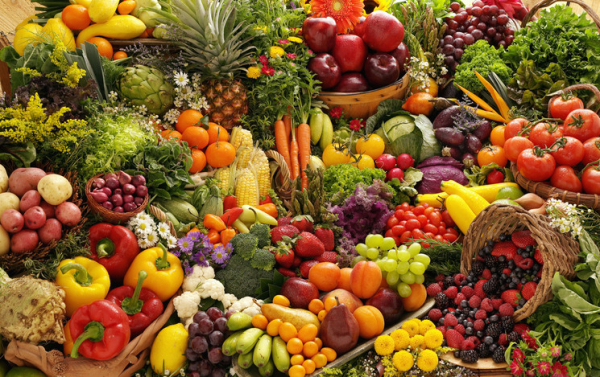
It’s no secret that the typical American diet isn’t very healthy. Only about one in 10 American adults eats the recommended daily amount of fruit (1-1/2 to 2 cups) or vegetables (2 to 3 cups). These dietary shortfalls are even more pronounced among people in lower income groups. And the health impacts are substantial: In the United States, poor diets have been linked with more than 300,000 annual deaths from heart disease and diabetes.
Produce prescriptions enable health care workers to give vouchers for free or discounted produce at grocery stores or farmers’ markets to people living in low-income neighborhoods. A recent study asks whether these programs might help people at risk for heart disease eat more fruits and vegetables, and possibly improve health issues like high blood pressure. While Dr. Anne Thorndike, an associate professor of medicine at Harvard Medical School who studies cardiometabolic disease prevention and nutrition security, questions some findings in the study, she notes that there are lessons to be learned here.
How was the study done?
The study pooled data on nine different produce prescription programs given out in 22 locations spread over a dozen states across the country. A total of about 2,000 adults and 1,800 children from low-income neighborhoods were enrolled. Participants received vouchers or cards to buy produce worth $15 to $300 per month (depending on family size). They also attended nutrition classes.
The programs lasted between four and 10 months. At the start and end of each program, participants filled out questionnaires about their fruit and vegetable consumption and health status. The questionnaires also asked about food insecurity, which is not having access to adequate food to meet one’s basic needs. Blood pressure, blood sugar, height, and weight were recorded for some program participants.
What were the findings?
During the produce prescription program, adults ate nearly one additional cup of fruits and vegetables per day; children ate an extra quarter-cup daily. In adults, these changes were associated with lower blood pressure in people who had high blood pressure and lower blood sugar in people who had diabetes. The researchers also documented drops in body mass index (BMI) among adults with obesity.
All glowing results, right? Well, maybe not.
“Because of the study’s limitations, including a lack of a comparison group — which is standard practice in diet studies — those potential health benefits are hard to prove,” says Dr. Thorndike. In addition, the investigators relied on statistical techniques to account for high rates of missing data from some programs, which could also skew results.
It’s hard to imagine how eating an extra serving of produce daily could lower BMI values within six months, says Dr. Thorndike. “However, there’s so much strong data that associates eating a healthy diet, particularly one that includes plenty of fruits and vegetables, with a lower rate of almost every chronic disease, including heart disease, cancer, and dementia,” she adds.
The bottom line
While flawed, this research is interesting, and highlights the need to improve diet quality for all Americans, especially those who face added barriers due to their financial circumstances.
“I’m a huge believer in produce prescriptions,” says Dr. Thorndike, “and part of my research mission is to determine the best way to design and deliver them so people get the greatest possible health benefit.”
The study also helps raise awareness about food insecurity, which affects about one in 10 American households. At the start of the study, more than half of the households participating reported food insecurity. Among all the participants, reported rates of food insecurity dropped by one-third by the end of the program compared to the start.
“We all need to acknowledge that many people are less healthy because they can’t get access to or afford the foods they need to prevent or treat disease,” Dr. Thorndike says. Broadening the focus beyond produce to “prescribe” other types of healthy foods, such as whole grains and lean proteins, may be another helpful solution, she adds.
About the Author

Julie Corliss, Executive Editor, Harvard Heart Letter
Julie Corliss is the executive editor of the Harvard Heart Letter. Before working at Harvard, she was a medical writer and editor at HealthNews, a consumer newsletter affiliated with The New England Journal of Medicine. She … See Full Bio View all posts by Julie Corliss
About the Reviewer

Howard E. LeWine, MD, Chief Medical Editor, Harvard Health Publishing
Dr. Howard LeWine is a practicing internist at Brigham and Women’s Hospital in Boston, Chief Medical Editor at Harvard Health Publishing, and editor in chief of Harvard Men’s Health Watch. See Full Bio View all posts by Howard E. LeWine, MD




